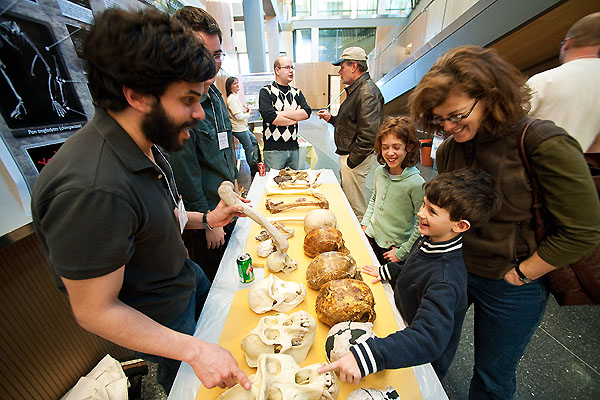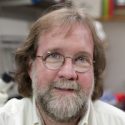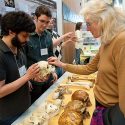Darwin Day celebrates evolutionary diversity of sex and reproduction

An anthropology graduate student points out the distinguishing characteristics of a group of skulls during Darwin Day 2009. This year’s events center around reproduction in the natural world.
Photo: Jeff Miller
The annual celebration of Charles Darwin’s birthday at the University of Wisconsin–Madison will showcase the evolutionary expressions of sex and reproduction in the natural world.
“Some fascinating examples of evolution can be seen in mating behavior,” says Alison Scott, the event organizer,” and people have always been interested in understanding how males and females get together.”
The keynote lecture at Darwin Day 2013 — “The Mating Game: Reproductive Evolution in the Natural World” — will focus on a bird that moves its wings faster than a hummingbird to serenade females.
“Many male birds sing and use showy feather displays to attract mates,” says Scott, a graduate student in botany, “but here’s a bird using its feathers to make music. This is the equivalent of putting on a Barry White album to set the mood, and an evolutionary case study in seduction.”
The weekend event, organized by the J. F. Crow Institute for the Study of Evolution, starts Thursday, Feb. 14 on the UW–Madison campus and is free and open to the public. Activities include:
- Teacher workshop, focused on integrating evolutionary concepts into science curriculum: 8 a.m. to 4 p.m., Thursday, Feb. 14. Registration required (see website below).
- Need a Valentine’s Day date with an evolutionary emphasis? “Love and sex in the natural world,” is a series of short films: 7 p.m., Thursday, Feb. 14, at Union South’s Marquee theater, 1308 W. Dayton St.
- “Evolution revealed: How to evolve a seductive musical instrument from feathers,” by Kim Bostwick of Cornell University: 7 p.m. Friday, Feb. 15, at the Wisconsin Institutes for Discovery, 330 N. Orchard St.
- “The most repulsive tree. The most remarkable fertilization system,” with Chris Smith of Willamette University: 10:30 a.m. Saturday, Feb. 16 at Wisconsin Institutes for Discovery.
- “Dolphin pelvic bones evolve in response to sexual selection,” presented by Matthew Dean of the University of Southern California: noon, Saturday, Feb. 16 at the Wisconsin Institutes for Discovery.
- Tree of Life Scavenger Hunt, 10 a.m. to 2 p.m. Saturday, Feb. 16 at the Wisconsin Institutes for Discovery. This interactive activity enables families to explore the incredible biodiversity of our living planet. Children will receive a prize for completing the hunt.
Darwin Day 2013 is presented in partnership with the Wisconsin Alumni Association and is supported by the College of Agricultural and Life Sciences, College of Letters & Science, School of Veterinary Medicine, School of Education, Laboratory of Genetics, and other organizations listed here (click “Darwin Day 2013”).



